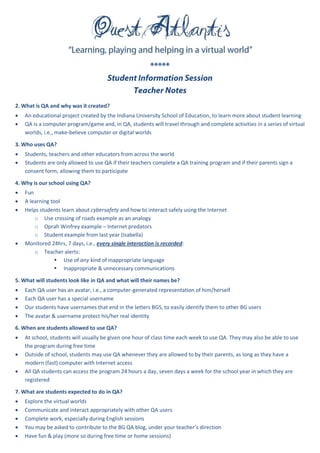
Quest Atlantis Student Information Session - Teacher Notes
- 1. 2. What is QA and why was it created? An educational project created by the Indiana University School of Education, to learn more about student learning QA is a computer program/game and, in QA, students will travel through and complete activities in a series of virtual worlds, i.e., make-believe computer or digital worlds 3. Who uses QA? Students, teachers and other educators from across the world Students are only allowed to use QA if their teachers complete a QA training program and if their parents sign a consent form, allowing them to participate 4. Why is our school using QA? Fun A learning tool Helps students learn about cybersafety and how to interact safely using the Internet o Use crossing of roads example as an analogy o Oprah Winfrey example – Internet predators o Student example from last year (Isabella) Monitored 24hrs, 7 days, i.e., every single interaction is recorded: o Teacher alerts: Use of any kind of inappropriate language Inappropriate & unnecessary communications 5. What will students look like in QA and what will their names be? Each QA user has an avatar, i.e., a computer-generated representation of him/herself Each QA user has a special username Our students have usernames that end in the letters BGS, to easily identify them to other BG users The avatar & username protect his/her real identity 6. When are students allowed to use QA? At school, students will usually be given one hour of class time each week to use QA. They may also be able to use the program during free time Outside of school, students may use QA whenever they are allowed to by their parents, as long as they have a modern (fast) computer with Internet access All QA students can access the program 24 hours a day, seven days a week for the school year in which they are registered 7. What are students expected to do in QA? Explore the virtual worlds Communicate and interact appropriately with other QA users Complete work, especially during English sessions You may be asked to contribute to the BG QA blog, under your teacher’s direction Have fun & play (more so during free time or home sessions)
- 2. 8. Can students do whatever they like in QA? No. Appropriate behaviour, language and work is expected Rewards for doing the right thing are free time in QA All teachers have access to a ‘Teacher’s Toolkit’, which allows them to monitor the students in their class 9. What happens to students who don’t use QA properly? Students who: o Behave or communicate inappropriately o Do not comply with expectations in any other way will jeopardise their inclusion in QA and may jeopardise the school’s involvement in the QA project Refer to Clustr Map on http://myquestatlantis.edublogs.org/ to illustrate the “global audience” 10. Tips for using QA: Restart computers prior to each QA session (to refresh the computer’s RAM) Be patient – Wait for items to load, especially during the first session or two, when the initialisation of the program occurs Do things in order. Completing steps out of order creates problems (QA is a complex computer program) Read instructions carefully Take notes – Have a dedicated QA book (or section of a book) Complete tasks properly – Missions & Quests should be completed to the highest of standards. If work is submitted to the Atlantis Council with lots of mistakes, e.g., spelling, punctuation and grammar, or you haven’t done things properly, it will be returned to you – to correct and resubmit o Use examples from Extension English last year o Make use of teachers and friends How to move your avatar in QA Exit correctly 11. Tips for behaving & communicating in QA: Never, ever divulge your real identity Be polite. Act and communicate appropriately (or it will come back to bite!) IBURST Rules 12. Parent Consent Forms: Must be returned to your English teacher, properly filled in. This includes parent names, student names and signatures No students are allowed to use QA until consent forms are returned 13. Where to from here? Students will have to choose appropriate usernames Student profiles will be set up by your English teacher Introductory activities will be completed: o Teachers – Work through the documents in your QA pack o Cybersafety video/s o QA Legend video o IBURST Rules o Guidelines/Expectations for how to complete Missions & Quests and how many are expected o Introductory Missions o Quests and other Missions 14. What happens if students do not participate in QA? They complete other work in QA sessions 15. Questions?
